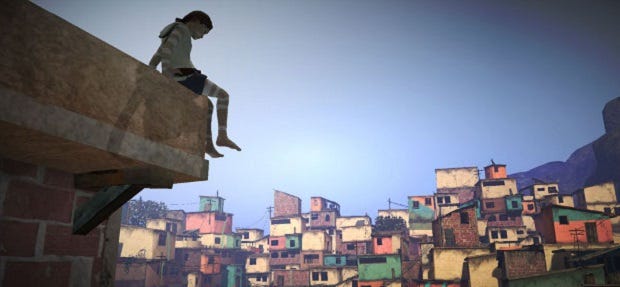Drinking Games: Addiction In Virtual Spaces
Lost Weekends
An exploration of addiction in gaming, whether as a mechanical device or something more.
“Looking for a fix, man?” asked the unscrupulous dealer who met The Courier at the gates of Freeside. “I got what you need.”
Money was tight, but Dixon’s self-branded whiskey seemed too good a deal to pass up. Four bottles in exchange for a handful of caps closed the deal before The Courier headed for The Atomic Wrangler to bunk for the night. His ten cap room wasn’t much, but four walls, a roof, and a locked door within this pocket of civilisation beat roaming the Mojave. These were perfect conditions to indulge in a bottle of his newly acquired firewater before bed.
The Courier awoke to three empty bottles, little memory post check-in, and a blinding headache. With the little cash he had, he headed for the slots, but not before sinking his last bottle to take the edge off.
The rest of the day played out in bursts of three; shuttle runs between the tables, the bar, the cashier’s desk - a desperate, yet ruthless trifecta. The next few days went much the same as The Courier sustained himself on a blur of whisky, beer, and small but steady roulette winnings. No food, no water, no sleep. Day four marked the end of his luck, not to mention his money, and a botched pickpocket attempt saw him finally outstay his welcome at The Wrangler, a sentiment confirmed by the ricochet of gunshots that ushered him to the door.
With no money and nowhere to go, The Courier spilled onto the streets, dehydrated and sleep deprived. Worst of all, though, he needed a drink. He needed a drink.
“Looking for a fix, man?” The Courier’s heart both sank and skipped a beat simultaneously. “I got what you need.”
Clean out of whisky, Dixon suggested a batch of his self-branded Jet amphetamine. The Courier reluctantly obliged, before crashing at a dilapidated house at the far end of town. A soiled mattress marked the end of his travels as he passed in his sleep.
Image taken from the Real World Drinks Alcohol Addon
---
Substance addiction is a subject almost completely ignored by video games. Few games have attempted to broach the subject, and those that have have tended to do so by enforcing tropes, or to facilitate plot devices.
In 2010’s Fallout: New Vegas, ‘hardcore’ mode forces players to monitor the protagonist’s sleep patterns, as well as his hydration levels. By overindulging in chems and/or alcohol there’s a good chance that The Courier will become addicted. At first, this creates certain perks for the hero - strength is increased after consuming booze, for example - but thereafter negatively affects his condition. He becomes lethargic, lacks focus, becomes dehydrated - this can eventually lead to death. Granted, New Vegas puts the problem of addiction in place, but then, frustratingly, does very little else with it.
The above narrative is an attempt to draw parallels with the real world and how very destructive substance addiction can be. However, in this virtual reality, addiction is so easily dealt with it is almost a gimmick. To put things into context, picking locks in The Atomic Wrangler proves a far more arduous task than going cold turkey, and a quick doctors visit can reverse any ill-effects instantly. That said, Obsidian’s post-apocalyptic Las Vegas sandbox is one of the few games which dares to portray a degree of real addiction at all.
So the ultimate question is why is this the case? If addiction is readily portrayed in literature, in cinema, in books, and in music, why are there not more substantial, more intelligent explorations of a very real and systemic social issue via video games - particularly given the interactive nature of the platform? If people want to understand drug addiction, video games can surely help bridge that gap.
Generally speaking, games - particularly those within the mainstream spectrum - fail to engage any systemic social issues head-on, tending to broach such concerns tangentially if at all. Societal issues - either sociopolitical or socioeconomic - are usually explored in order to prop up the functions of genres (as in much genre fiction in other media), and thus are rarely scrutinised at any length.
“I think there’s still this idea that people don’t understand addiction as a coping mechanism often for stress and trauma,” says Harry Shapiro, the chief executive of UK-wide addiction information charity DrugScope, pointing to the stigma that society tends to hold against substance addiction. “No one rightly wants to become addicted to drugs or alcohol, or anything for that matter, obviously people find themselves in situations where they then turn to drugs or alcohol to cope. But the problem is, of course, you make a choice to start taking drugs, whatever it may be. However justified the reasons might be, some people see this is as, ‘well, that’s your decision, that’s your lifestyle choice, hard luck if you get into trouble.
“That said, we carried out a general public poll just a few years ago, and there was a lot of sympathy for the idea that if people want to get off drugs or alcohol, then there should be proper services to help them do that. People do understand to some extent - people get themselves into these situations, but still should be able to be helped out of them.”
Video games don’t necessarily have the power to directly help people out of such compromising situations, but given the recent surge of independent games tackling wider and deeper social themes - Actual Sunlight, Depression Quest, and Ether One, to name but a few - they could serve to better educate people about the illness of addiction.
Instead, what we have are games like Max Payne 3, which depicts its protagonist as an alcoholic, but instead of doing so with empathy, Payne’s addiction really only serves to perpetuate a handicap and his image as a stereotypical emotionless ‘lone wolf’; glamourising his alcoholism in the way that The Sopranos glamourises organised crime. BioShock’s portrayal of addiction crudely facilitates its foes in the way of violent, gene tonic-obsessed Splicers, not to mention Jack’s reliance on Eve to succeed. Even though it may well be intended as a satirical swipe at Nancy Reagan’s “War on Drugs” political campaign of the time, Williams’ 80s classic NARC saw the protagonist rid the streets of roaming ‘junkies’ with a machine gun as a means of combating drug addiction. Charming.
Shapiro notes that the internet has blown the conversation about drugs in the public domain wide open. Information can now be shared freely on a global scale which is a great thing, yet it’s also introduced easier means of sharing drugs and drug recipes - particularly via the dark web. Although not particularly well-versed in video games, Shapiro mentions a recent magazine article which caught his eye - a piece about GamerGate, and how Zoe Quinn’s Depression Quest was under fire. Shapiro hadn’t known about the game before and the article brought it to his attention. Instead of focusing on the negatives of the situation, he identified that the game’s treatment of the issue suggested there was scope for innovation in his own field.
“I don’t actually know all that much about games - I’m not a gamer,” he says. “But I can see that if it’s done in the right way with the right kind of motivation behind it, and of course the right research and evidence, then it could be a great thing. There’s plenty of rubbish out there, not just in games, in everything: drug information, drug films, and so on.
“If it’s done in the right way, though, and it’s entertaining as well as educational, it could be good. I’m interested in talking to people who develop these games because I think it’s an area that hasn’t really been explored properly and, potentially, could be very valuable.”
One such game which does approach substance addiction from an educational and wholesome point of view is Minority Media’s Papo and Yo. Based upon creator Vander Caballero’s real life experiences with an abusive alcoholic father, Papo and Yo sees protagonist Quico at times help, and other times flee, a monster type figure which stands as a metaphor for his childhood.
The aim of the game is to tackle a series of puzzle set pieces, whilst directing the monster along the way. At first, the monster seems endearing, but eventually frogs are introduced to the game’s puzzle mechanics, which represent alcohol. By consuming the frogs, the monster is sent into a burning rage whereby he then seeks to attack Quico with depicting the very real Jekyll and Hyde personas of Caballero’s now deceased father.
“I had to tell the story in a medium that no one had told before,” Caballero explains. “I had to show something that could actually help [the player] to be in my shoes, and see what I felt. In video games, the topic of addiction is barely touched upon, there are so many topics which we do not touch. But video games are very powerful simulations that give us a lot more in depth emotion experiences with the subject, for example when you go to a movie, you sit for two hours, you identify yourself with the character, and then you just leave. In games like Papa and Yo, you are actually there in real time. If you drop the controller, the monster is still enraged. If you stand still, what is he going to do? He’s going to attack you.
“At the moment, the most precious thing is - because actually you’re dealing with the most difficult emotions that you’ve lived through in the past - you’re reliving them; but you’re reliving them in a safe place. That is the power of video games, and I think that’s why Papo and Yo was appreciated. I think people appreciated the game because it’s inspiring the medium of video games to confront a sensitive subject.”
The juxtaposition between the whimsical and the terrifying in Papo and Yo illustrates the temperamentality of substance addicts so well that even those with little understanding can appreciate Caballero’s message. Papo and Yo marks a milestone in how video games can not only acknowledge addiction, but can also serve to educate in an oft-ignored area.
In essence, the industry is growing up. The average age of video game players in the UK is now 35 years old, thus the average player is likely to know, or have crossed paths with, or have at least heard of an addict at some point in their lifetime. There is more space now for the conversation than ever, and as an interactive medium video games can help broaden and modernise the discussion.
“We’re just at the beginning of a new era in video games - one that we’re striving to tackle difficult subjects all around,” adds Caballero. “A lot of beautiful independent games will be released in years to come. Once you open the genie bottle, a lot of personal things will come out that are really touching. But it’s really hard as an independent developer to be in the position where you’re able to take a leap of faith and create an emotional game - to find money to make them and in turn make money back. The drama genre in movies is highly profitable and sustainable - we don’t have a sustainable model to create games like Papo and Yo, just yet.”
The drama genre in gaming is expanding, however, both through the creation of games that fit directly within it, and through the introduction of everyday concerns and social issues in the sci-fi and fantasy mainstays. The ways in which BioWare weaves real life drama, tension, love, and loss into its Mass Effect series strikes at the heart of its players, and Obsidian handles similar themes with comparable prestige in the aforementioned Fallout: New Vegas. DontNod Entertainment’s Life Is Strange is in essence a coming of age of story - dealing with cliques, abuse, friendship, and romance. Although not entirely divorced from sci-fi elements, it does have a more distinct focus on the real world when compared to its genre counterparts.
With Papo and Yo, Minority Media has set a precedent and a standard for itself, in continuing to push boundaries and by tackling subject matter which evokes social commentary - something Caballero freely admits. After the game’s release, Minority was inundated with personal tales from players who could easily relate to the game. By playing out Caballero’s metaphorical depiction of his formative years, players saw their own stories, and their own struggles and experiences with addiction, and they thanked Caballero for his creation.
Perhaps one of the most interesting stories was sent from a father who had watched his son playing Papo and Yo. He later contacted Caballero to say that the game had made him realise how his son felt whenever he chose to shout at him. Not only can a game like Papo and Yo touch victims, but it can also touch the aggressors; again testament to the power of the medium.
“I think there could be a market for this kind of thing that simply goes beyond people who play games,” says Shapiro. “Unfortunately there’s a certain image of the kind of people who’re deep into gaming, but I think if you did the right sort of game then it could be valuable for professionals, for clinicians, staff who work in treatment services - all kinds of people - who aren’t your classic, stereotype of a gamer.
“So as well as an audience within the traditional gaming community for this kind of thing, I think it’s got a potential beyond that.”
For information and help with addiction, check the list of resources below (UK only):
DrugScope: 020 7234 9730; info[at]drugscope[dot]co[dot]uk
Talk to FRANK: 0300 123 6600; text 82111; frank[at]talktofrank[dot]com
Alcoholics Anonymous UK: 0845 769 7555; help[at]alcoholics-anonymous.org.uk
















